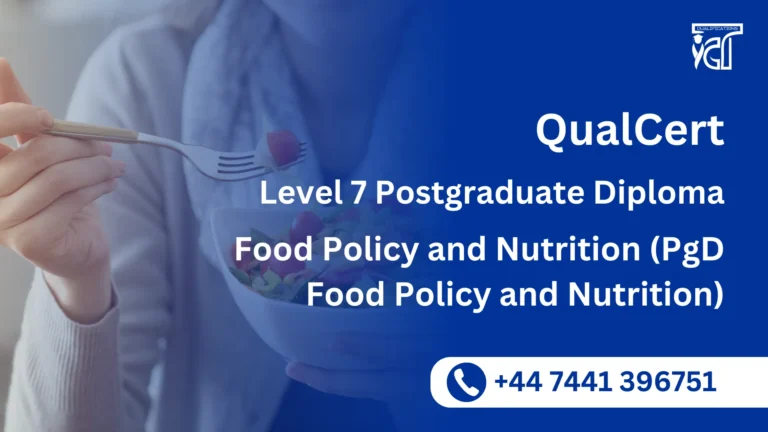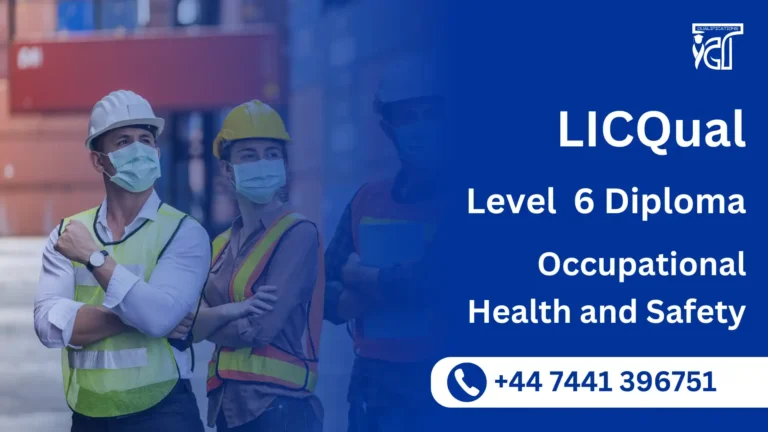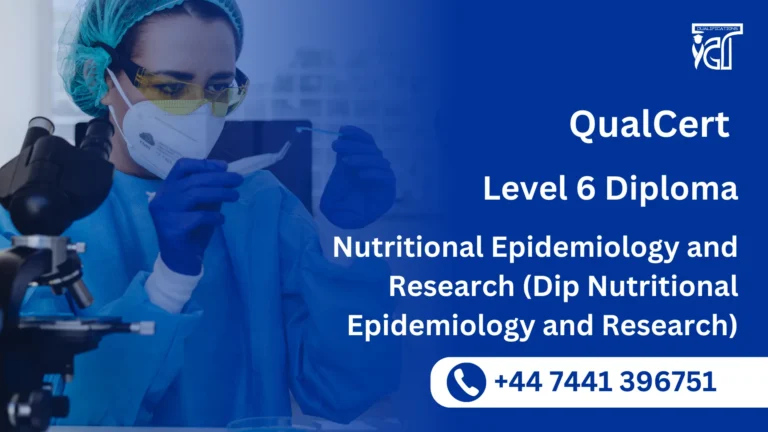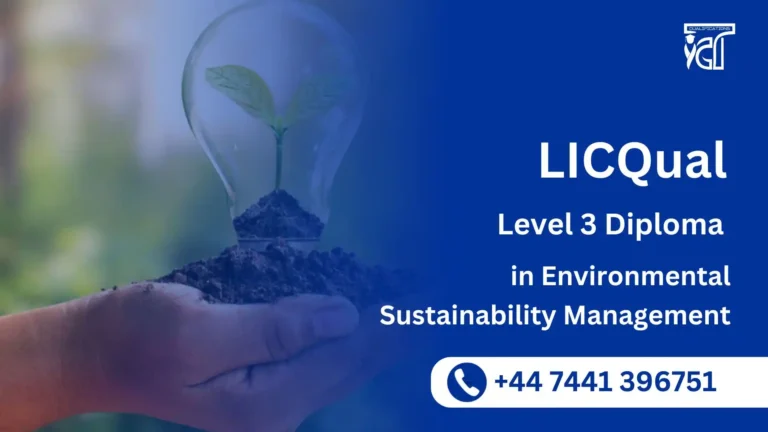Are you looking to become an accredited vocational assessor and play a key role in shaping the future of skilled professionals? The LICQual Level 3 Certificate in Assessing Vocational Achievement is designed for individuals who are passionate about teaching and assessing in vocational education and training (VET). This certification will equip you with the essential skills and knowledge required to effectively assess learners’ competency and vocational skills.
The LICQual Level 3 Certificate in Assessing Vocational Achievement is a comprehensive qualification designed for individuals who wish to become qualified assessors in vocational settings. It provides a deep understanding of the assessment process, including how to assess both competence and knowledge in various vocational contexts. Whether you’re already working in education or planning to start a career in assessment, this qualification ensures that you are well-prepared to carry out your duties professionally and effectively.
This certificate qualification is specifically designed for those involved in the assessment of vocational achievement within a variety of educational and training environments. As an assessor, your role will involve evaluating learners’ performance against nationally recognized standards, offering valuable feedback, and ensuring learners meet the required competencies.
The LICQual Level 3 Certificate in Assessing Vocational Achievement will help you gain insight into the core principles of assessment, including planning, carrying out assessments, and understanding how to judge and verify vocational competence. This qualification is ideal for anyone who wants to assess learners in fields such as business, health and social care, engineering, and more.
The LICQual Level 3 Certificate in Assessing Vocational Achievement is a key qualification for anyone looking to become a qualified vocational assessor. It provides the essential knowledge and practical skills to assess learners in a professional and structured manner, enhancing your career prospects in education and training.
Whether you are already working in education or aiming to move into the field, this qualification opens up opportunities for career advancement and further professional development.
Take the first step towards becoming a certified vocational assessor by enrolling in the LICQual Level 3 Certificate in Assessing Vocational Achievement today!
LICQual Level 3 Certificate in Assessing Vocational Achievement
Following are the mandatory units of LICQual Level 3 Certificate in Assessing Vocational Achievement”
| Unit Ref# | Unit Title | Credit | GLH |
| LICQ2200137-1 | Understanding the Principles and Practices of Vocational Assessment | 4 | 20 |
| LICQ2200137-2 | Assessing Vocational Skills, Knowledge, and Understanding | 4 | 20 |
| LICQ2200137-3 | Assessing Occupational Competence in the Work Environment | 4 | 20 |
| LICQ2200137-4 | Legal and Ethical Considerations in Vocational Assessment | 4 | 20 |
| LICQ2200137-5 | Ensuring Quality in Vocational Assessment | 4 | 20 |
| LICQ2200137-6 | Providing Effective Feedback to Learners | 4 | 20 |
GLH (Guided Learning Hours) and TQT (Total Qualification Time) are terms commonly used in vocational qualifications to help define the amount of time a learner is expected to spend on their studies.
1. GLH (Guided Learning Hours)
GLH refers to the number of hours a learner spends being directly taught, supervised, or supported during their course. This includes the time spent in activities such as:
- Classroom instruction
- Practical workshops
- One-on-one tutoring or mentoring sessions
- Online learning sessions with tutor support
In other words, GLH represents the time that learners are actively engaged with their instructors or learning activities.
2. TQT (Total Qualification Time)
TQT represents the total amount of time a learner is expected to invest in completing a qualification, including:
- GLH (Guided Learning Hours): Time spent on direct learning, as explained above.
- Self-Directed Learning: This includes time spent on independent study, research, assignment completion, preparation for exams, and any other work the learner does outside of direct teaching hours.
TQT is a broader measure that includes all the time required to achieve the qualification. It helps learners and employers understand the overall commitment required for the qualification.
Key Differences Between GLH and TQT:
- GLH focuses on direct learning with guidance or supervision.
- TQT includes GLH as well as independent study time and other learning-related activities.
Example:
If a qualification has a TQT of 600 hours and a GLH of 250 hours, it means the learner should spend 250 hours in direct learning (classroom, online, or tutor-led sessions) and 350 hours on independent study or research.
By the end of this course, learners will be able to:
Understanding the Principles and Practices of Vocational Assessment
- Demonstrate a comprehensive understanding of the core principles of vocational assessment, including validity, reliability, and fairness.
- Understand the role of an assessor in ensuring the effective and fair evaluation of learner achievements.
- Identify various assessment methods and explain their appropriate use in vocational contexts.
- Plan and design vocational assessments that align with the intended learning outcomes and industry standards.
Assessing Vocational Skills, Knowledge, and Understanding
- Assess vocational skills, knowledge, and understanding through a variety of methods, including practical tasks, assignments, and written assessments.
- Apply appropriate assessment tools and techniques to evaluate learners’ vocational competence.
- Understand how to ensure the accuracy and fairness of assessment outcomes, considering the diverse learning styles and needs of students.
- Align assessments with industry standards and required learning outcomes to ensure relevance and effectiveness.
Assessing Occupational Competence in the Work Environment
- Implement effective strategies for assessing occupational competence in real-world work environments.
- Design and carry out assessments that reflect authentic tasks and challenges learners will encounter in their profession.
- Evaluate learners’ performance in the workplace, ensuring assessments are aligned with job-specific competencies and industry expectations.
- Integrate work-based assessment with theoretical learning to provide a holistic view of learners’ occupational competence.
Legal and Ethical Considerations in Vocational Assessment
- Recognize the legal responsibilities involved in the vocational assessment process, including compliance with relevant legislation and regulations.
- Understand ethical considerations such as confidentiality, equality, and diversity, and how these principles apply to assessment practice.
- Ensure fair and transparent assessment procedures that respect the rights of learners and adhere to ethical standards.
- Manage sensitive situations in assessments while maintaining professionalism and integrity.
Ensuring Quality in Vocational Assessment
- Implement quality assurance procedures to ensure consistency and fairness in vocational assessments.
- Understand the process of internal and external verification, ensuring assessments meet the required standards and regulations.
- Identify areas for improvement in assessment practices and implement corrective actions to enhance the quality of assessment processes.
- Evaluate assessment outcomes and feedback to maintain high standards in vocational assessment practices.
Providing Effective Feedback to Learners
- Provide clear, constructive, and actionable feedback that helps learners understand their strengths and areas for improvement.
- Use feedback as a tool for motivating learners and promoting their development in vocational settings.
- Deliver feedback in a way that fosters a positive learning environment, ensuring learners feel supported in their journey.
- Adapt feedback methods to suit the individual needs of learners, ensuring it is relevant, specific, and focused on achieving vocational goals.
Benefits of the LICQual Level 3 Certificate in Assessing Vocational Achievement
Industry-Recognized Qualification
The LICQual Level 3 Certificate in Assessing Vocational Achievement is an Ofqual-regulated qualification that holds international recognition. This means that the certification is acknowledged by employers and educational institutions worldwide, ensuring your skills and competencies are valued globally.
Enhances Career Opportunities
Achieving the LICQual Level 3 Certificate opens up numerous career opportunities in the field of vocational education and training. Whether you want to become a vocational assessor, trainer, or work in quality assurance, this qualification provides you with the credentials and expertise required to pursue these roles in various industries, including healthcare, construction, engineering, and more.
Develops Practical Assessment Skills
The course offers hands-on training in assessing both competence and knowledge in vocational contexts. You’ll learn how to plan and deliver assessments, provide meaningful feedback to learners, and ensure assessments are fair, valid, and reliable. These practical skills are essential for anyone looking to work in vocational assessment.
Improves Learner Success
By becoming a qualified assessor, you play a key role in supporting learner success. This course helps you develop the skills to provide effective feedback, evaluate performance accurately, and assist learners in meeting their vocational goals. Your expertise in assessment will contribute directly to better learner outcomes and career progression for students.
Flexible and Accessible Learning
The LICQual Level 3 Certificate offers flexible learning options that allow you to study at your own pace. Whether through online learning or blended delivery, the course can fit into your existing schedule and lifestyle, making it easier to balance work, life, and study commitments.
Pathway to Higher Qualifications
Completing the LICQual Level 3 Certificate in Assessing Vocational Achievement is a stepping stone to higher-level qualifications in vocational assessment. You can progress to Level 4 or Level 5 qualifications in internal quality assurance or education and training, enhancing your career prospects and expertise in the field.
Boosts Professional Credibilit
This qualification boosts your professional credibility as an assessor. Employers and training organizations value accredited assessors who have proven knowledge and skills in assessing learners. Holding this certificate signifies your commitment to maintaining high standards in vocational education.
Improves Employability
With the growing demand for qualified assessors, this qualification makes you a more attractive candidate in the job market. Whether you’re aiming to become an internal assessor within an organization or freelance as an independent assessor, having this certification improves your job prospects and employability.
Supports Quality Assurance
As a qualified assessor, you are responsible for ensuring that assessments are fair, transparent, and aligned with regulatory standards. This qualification helps you contribute to quality assurance processes in vocational training, ensuring consistency and integrity in assessment practices.
Increases Confidence in Assessment
The LICQual Level 3 Certificate provides the foundational knowledge and skills necessary to approach assessments with confidence. You will understand how to evaluate learners effectively and make unbiased, evidence-based decisions, which will increase your effectiveness as an assessor and instill trust with learners and colleagues.
This diploma is ideal for:
- LICQual Level 3 Certificate in Assessing Vocational Achievement is designed for individuals who are working or planning to work as assessors in vocational education and training.
- LICQual Level 3 Certificate in Assessing Vocational Achievement is ideal for those already in roles such as vocational assessors, trainers, or workplace mentors who want to formalize and expand their assessment skills.
- Professionals working in sectors such as healthcare, construction, business, engineering, and education, who assess vocational qualifications, will benefit from this course.
- The course is suitable for individuals who want to gain an understanding of assessment principles, methods, and practices in order to assess vocational achievement effectively.
- Those who wish to move into assessment roles in vocational learning environments or improve their current qualifications as assessors will find this course invaluable.
- LICQual Level 3 Certificate in Assessing Vocational Achievement is also ideal for professionals seeking to enhance their ability to deliver constructive feedback and assess learners’ competence in practical work-based settings.
- The course is beneficial for individuals aiming to understand legal, ethical, and quality assurance aspects of vocational assessment in regulated industries.
Entry Requirements
Register Now
Qualification Process
Qualification Process for the LICQual Level 3 Certificate in Assessing Vocational Achievement
- Self-Assessment:
Begin by evaluating your eligibility to ensure you meet the qualification requirements, including work experience, knowledge, and language proficiency. - Registration:
Complete your registration by submitting the required documents, including a scanned copy of a valid ID, and paying the registration fee. - Induction:
An assessor will conduct an induction to confirm your eligibility for the course and explain the evidence requirements. If you do not meet the criteria, your registration will be canceled, and the fee will be refunded. - Assignmnets & Evidence Submission:
Provide all assignmnets and the necessary evidence based on the assessment criteria outlined in the course. If you are unsure of the required evidence, consult with the assessor for guidance on the type and nature of evidence needed. - Feedback and Revision:
The assessor will review your submitted evidence and provide feedback. Evidence that meets the criteria will be marked as “Criteria Met,” while any gaps will be identified. You will be asked to revise and resubmit if needed. - Competence Evidence:
Submit final evidence demonstrating that all learning outcomes have been met. This evidence will be marked as “Criteria Met” by the assessor once it is satisfactory. - Internal Quality Assurance (IQA):
The Internal Quality Assurance Verifier (IQA) will review your evidence to ensure consistency, quality, and compliance with standards. - External Verification:
The IQA will submit your portfolio to LICQual External Quality Assurance Verifiers (EQA) for final confirmation. The EQA may contact you directly to verify the authenticity of your evidence. - Certification:
Upon successful completion of all checks, LICQual will issue your official certificate, confirming that you have attained the LICQual Level 3 Certificate in Assessing Vocational Achievement.







